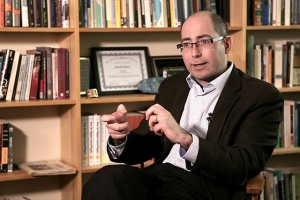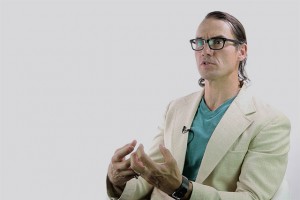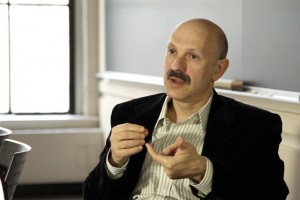Hippies Counterculture and the Quantum Revival
Historian of science David Kaiser on clever provocations of a group of young physicists in Berkeley, quantum e...
What is the attitude to copyright in Europe and the USA? What has changed with the appearance of the Internet? What did Wikipedia do to protect its rights? Professor at Chapman University School of Law, Tom Winston Bell, talks on the awareness of common citizens of what copyright actually is.
Copyright is so called form of intellectual property and it protects original, fixed expressions of authorship, that is books, scholarly papers, paintings, movies, songs. It’s interesting to look at the worldwide trends in copyright. And I think we see that the United States has influenced the rest of the world and the rest of the world has influenced the United States and unfortunately I think in both cases we’ve had bad influences.
Now, much of this has happened under the Berne Convention, which is an international agreement for the protection of copyright. And almost every country in the world is a member the Berne Convention. And unfortunately I think it originated in Europe and its influence the United States unfortunately gets away, because the European approach to copyright has traditionally been moreover romantic view. I don’t mean romantic in the sense of, you know, love; I mean romantic in the sense of the nineteenth century view of the author and this originated originally in Hegel’s view of authorship and then later European philosophers developed it.
The American view traditionally has been more utilitarian and that I think is a good thing. In the United states traditionally basically copyright was just a tool of industrial policy. It wasn’t about protecting artists souls, it was about making sure the words of books and songs and movies to keep consumers happy. And so we created rights not to protect authorship, but to make authors create things. It’s like dangling a carrot on a stick in front of a donkey to get him to walk. And so you just say to authors, “We’ll give you this limited rights to encourage you to write, say, a novel and we’ll have a nice new book for the world.” And it’s traditionally been an American view.
So as I say American view’s of copyright been influenced by the Berne Convention. I think unfortunately, but the influence goes the other way also.
The United States has influenced world copyright in some unfortunate ways and mostly that’s been by making copyright much more powerful.
The United States has a very strong copyright lobby – New York publishing houses and of course Hollywood, the music industry, the movie industry – they keep going back to the US Congress and saying, “Give us more, more, more.” And they keep getting more, more, more until very recently they’ve been getting more, more, more. And then the United States goes other countries and says, “Well, look, artist in Hollywood, they get this kind of protection, we want this kind of protection in England and in France and in Russia.” And so that’s resulting in copyright terms getting longer and longer, copyright right’s getting more and more powerful in broad.
So we see these two influences, and I think they both unfortunate: from Europe to the United States embodying copyright with this philosophical idea that it’s not just utilitarian, it’s about a philosophical view about protecting the souls of authors. I’ think that’s kind of silly, but that’s what’s happened. That’s interesting to consider the influence that hackers and pirates have had on copyright. Although I’m a skeptic on copyright, I’m not anti copyright, so I will not say I smile on what hackers and pirates have done, I’m not defending them, but I will say that in some ways they’ve made things better for consumers and I’ll give you an example from the music industry. There was a time in, I’d say, late nineteen nineteens and early 2000’s in which it became very common free services like Napster for people to download music illegally and many many people did it. I talked to my students and they got their music for free basically on the Internet. Now I won’t say I think that was a good thing, but it did have this benefit.
So, that’s a good thing. I think we’re starting to see the same thing with regard to movies. People can download the movies through the Internet illegally, but it’s not very convenient. And now we have services like streaming videos from Netflix and again I think we see the same dynamic. In industry after industry with a right of copyright we have consumer demand which is not being met by the incumbents, because the incumbents don’t care – they can sue when people get things illegally or so they think.
And the Internet changes that, it makes it easy for people everywhere through their computers to get illegal access to copyrighted works. And the industry has to change a business model to accommodate and they are not making money, a consumer is not making money. And you can, I suppose, still download pirated music if you want to, but hardly anyone bothers, because it’s not convenient, the interface isn’t very good and you worry that you getting maybe a virus when you download something that looks like a song, you’re not comfortable with that, so you just go to iTunes. And so it’s a good thing all around but it seems that we have to have the pirates and the hackers encourage the music and publishing industry to improve their products and we’re seeing that in. So every cloud has a silver lining and that’s the silver lining with regard to pirates and hackers.
From the United States to Europe and the rest of the world we get more and more legal protections for authorship and I think it’s gone too far. That’s all very unfortunate but I do want to offer an optimistic note. Recently in the United States there’s been a slight change from that and it’s been a good change. An this happened in the early 2000 teens, will say around 2012 and 2013. And lawmakers proposed yet another change to copyright law and it made average citizens upset, because they learned that it might restrict their rights to use things like Wikipedia.
And so Wikipedia put up these pages, when you went to Wikipedia there was a page that it was blacked out as part as their public awareness effort. And so people in the street, really at their computers, discovering that copyright might actually limit my access to Wikipedia and Google searches and all the things that I love about the Internet. Then I don’t like that and Wikipedia and Google told people, “Write your congressmen or congresswoman and tell them you don’t like this,” and they did.
Suddenly for once finally lawmakers discovered that if they increased copyright members of the public would get upset.
And so this changed copyright in the United States, a change the politics of copyright.
I was just in Washington in the spring of 2014 talking with lawmakers and I discovered that they were very worried about having that same thing happen again. And I think that’s good and healthy thing. Finally the average citizens learned that copyright can hurt them if it goes too far and they have told lawmakers and lawmakers are paying attention. So finally there is kind of a counterweight to the copyright lobby and hopefully in the long run that will make copyright healthier, more balanced because for too long it’s been more and more and more copyright. And It’s going too far so there’s hope to think that in the future we’re going to see a more balanced approach to copyright at least in the United States. I can’t speak about Europe, but the United States is such a powerful influence in the world with regard to copyright. Hopefully if things in the United States become a little more healthy insane that will help to make things worldwide a little better for copyright also.

Historian of science David Kaiser on clever provocations of a group of young physicists in Berkeley, quantum e...

Lawyer Tom Winston Bell on the Berne Convention, music pirates, and the copyright lobby

MIT Lecturer Vyacheslav Gerovitch on Sergei Korolev’s design bureau, the leadership of the Soviet cosmonauts, ...